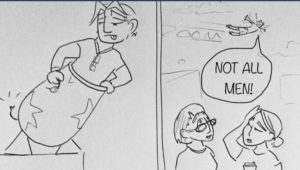
Three years ago, my artist friend Heather and I created a secret web comic to mock the outlandish behavior of men. Officially its purpose was to call out “woke” male academics who gain social capital by posing as allies online while still treating women like dirt in their everyday lives. Rather than introducing a whole new cast of characters for each situation, our comic stars Chad T. Brooks, a floppy-haired amalgam of your basic late-twenty-something bro-ets (that’s bro-poets for those who are unaware).
Don’t let his self-assured, corn-fed looks fool you, though: Chad isn’t like the other guys. He’s a nice guy. He’s sensitive! He’s down for the cause! Or, at least he did purchase a ten-dollar Hillary mug after it was clear that Bernie had lost the Primaries, and he’ll perform a soliloquy on the exact moment his allegiance shifted while letting his hand linger (in a totally platonic, perhaps almost protective way) on the small of your back. Without a doubt, Chad T. Brooks is “the noblest white dude you know.”
He’s a Slytherin in Hufflepuff’s clothing, a run-of-the-mill misogynist in a pink pussy hat who’s marching (for the ‘gram) with a “Believe Women” sign. In our current #MeToo era, we’ve had Chad’s number for a while now, and it seems like the rest of the world is finally catching up to what we women have known all along: The number of feminist articles a man posts is in direct proportion to the miles you should run away.
“Keepin’ It Chad” is our attempt to balance the scales. Our comic is the most joyful, petty, reckless, silly, and emboldening thing that I do—or, rather, that we do, Heather and me, together. The collaboration is what makes it fun and what makes it powerful.
Our creative partnership began with simple storytelling about a year after we became friends. I would vent to Heather about the sexist microaggressions I experienced in the academic and writing worlds, and she’d sketch them out on scratch paper, complete with conversation bubbles and puns, to make me feel better. That was always our initial endeavor in both the stories I told her and the sketches she drew for me—to make each other laugh.
And there was power in that laughter. Suddenly, this annoying or even hurtful thing that had just happened to me didn’t sting quite so much. I was no longer the one being used or condescended to or ignored. I was no longer the butt of the joke.
Instead, we literally designed the perpetrator to be ridiculous. As the comic matured, we drew on our shared love for hyperbole and absurdism: Chad combusts in a puff of smoke because he can’t figure out if he should shake a woman’s hand or hug her. A mini Chad in a top hat and waistcoat pops out of a phone screen like Jiminy Cricket and squeaks, “But Pence could be worse!” Chad blasts himself out of a canon, declaring “Not all men!” as he flares across the sky. We created these images. Rather than being passive, we were active. With our words and minds and pen, we were the ones in charge now.
This role reversal got us thinking about how humor can function, not to downplay gender-related oppression, but to brandish as a weapon for our empowerment and survival. Of course, drawing a farcical comic and writing a clever caption cannot undo the real difficulty that inspired it or change the systems of oppression that allow Chads to exist in the first place. But, at the very least, our use of satire could illuminate a possible force to overcome paralyzing despair. Humorous rhetoric could work as both a lantern and a sword to reclaim our narrative authority.
After the 2016 election, “Keepin’ It Chad” is no longer a secret. We display it proudly on keepinitchad.tumblr.com, and it will soon exist as the website keepinitchad.com as we develop it further. Even with its more public presence, though, we reject the goal of trying to reach out and reform others. Educating the Chads of the world is not our intention. We as women perform far too much emotional labor every day to expect our humorous outlet to undo years of deeply ingrained sexism and misogyny.
Alternatively, we view our comic as a resource to embolden other women with internal fortitude. We can let them know they’re not alone and that the reductive and hurtful things these men say and do to them are not isolated incidents but rather ongoing patterns of sexist behavior. In fact, the most rewarding aspect of our project is the community we’ve built along the way. Both newcomers and longtime female friends have approached us with saying, “So, this happened to me…” and then we have the privilege and challenge of flipping the script to turn their perpetrators into the ones who are actually ignorant and foolish, not the women themselves.
The best part is that we get to make our friends laugh. A narrative that once caused irritation, frustration, or pain can now burn like a talisman in their chests. Sometimes resistance is as simple as changing the direction of one small story. Sometimes it’s transforming the way you feel in your own body—that subtle yet remarkable shift from passivity to action. Collaborative storytelling and humor can perform this kind of alchemy. Let’s work to keep that magic aflame.
 Today we are pleased to feature author Kelly Hill as our Authors Talk series contributor. In this podcast, Kelly discusses two books she has recently read that both inspire and enlighten her: Doing Harm: The Truth About How Bad Medicine and Lazy Science Leave Women Dismissed, Misdiagnosed, and Sick, by Maya Dusenbery, and We Show What We Have Learned & Other Stories, by Clare Beams.
Today we are pleased to feature author Kelly Hill as our Authors Talk series contributor. In this podcast, Kelly discusses two books she has recently read that both inspire and enlighten her: Doing Harm: The Truth About How Bad Medicine and Lazy Science Leave Women Dismissed, Misdiagnosed, and Sick, by Maya Dusenbery, and We Show What We Have Learned & Other Stories, by Clare Beams.
 Today we are pleased to feature author Meriwether Clarke as our Authors Talk series contributor. Meriwether discusses the way that all three of her poems from Issue 18 focus on female shame. She reveals that she likes to think about her poems “as something that can potentially help a reader question the dominant narrative our society tells.”
Today we are pleased to feature author Meriwether Clarke as our Authors Talk series contributor. Meriwether discusses the way that all three of her poems from Issue 18 focus on female shame. She reveals that she likes to think about her poems “as something that can potentially help a reader question the dominant narrative our society tells.”